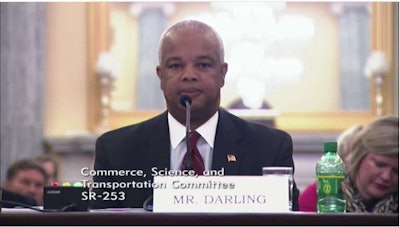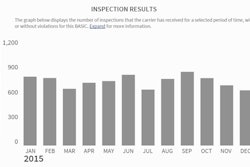 Darling testified Jan. 20 before the Senate’s Commerce Committee as the next step in his nomination process to become the next administrator of FMCSA.
Darling testified Jan. 20 before the Senate’s Commerce Committee as the next step in his nomination process to become the next administrator of FMCSA.A Congressionally required study of truck operators and FMCSA’s 2013-instituted 34-hour restart regulations has been completed and is now under review by the Department of Transportation’s Office of the Secretary, said Scott Darling, nominated administrator of the Federal Motor Carrier Safety Administration, at a Senate hearing Jan. 20.
Reimplementation of the rules, suspended by Congress in late 2014, is contingent on the study’s completion and review by the DOT, the Office of the Inspector General and Congress itself.
Darling couldn’t offer lawmakers an exact timeline on the study’s movement from the DOT to the Inspector General and Congress, but Darling called the report “one of the best studies” ever done on hours-of-service regulations.
Darling testified before the Senate’s Commerce and Science Committee for nearly an hour as the next step in his nomination process. President Obama nominated Darling to head FMCSA in August 2015, a post made vacant by former Administrator Anne Ferro’s resignation in August 2014.
For Darling to head the agency on a permanent basis, he must be confirmed by the Senate. Prior to a full vote by the Senate, however, the Senate’s Commerce Committee will vote on whether to send Darling’s confirmation to the full Senate. That vote has not yet been scheduled.
In addition to the brief discussion on the 34-hour restart study, Darling again said he hopes to make 2016 a “year of partnerships” between the agency and the trucking industry, telling lawmakers he’s committed to making the agency more in tune with the industry it regulates. He cited last year’s entry-level driver training “negotiated rulemaking” as an example of such partnerships. “We (FMCSA) can’t do this alone,” he said.
Darling was also asked by the committee about FMCSA’s next steps in fixing the problems that plagued the agency’s Compliance, Safety, Accountability program, ones brought to light by both CCJ reporting and subsequent independent government review reports that eventually led to Congressional action to remove CSA’s Safety Measurement System alerts and percentile rankings from public view.
Darling said the agency is in talks with the National Academies of Science about studying the program and addressing the issues brought by previous studies and reports.












